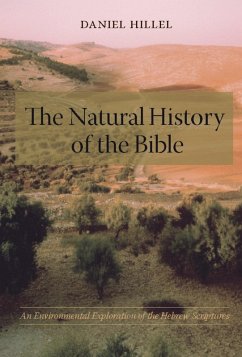Traversing river valleys, steppes, deserts, rain-fed forests, farmlands, and seacoasts, the early Israelites experienced all the contrasting ecological domains of the ancient Near East. As they grew from a nomadic clan to become a nation-state in Canaan, they interacted with indigenous societies of the region, absorbed selective elements of their cultures, and integrated them into a radically new culture of their own. Daniel Hillel reveals the interplay between the culture of the Israelites and the environments within which it evolved. More than just affecting their material existence, the region's ecology influenced their views of creation and the creator, their conception of humanity's role on Earth, their own distinctive identity and destiny, and their ethics.
In The Natural History of the Bible, Hillel shows how the eclectic experiences of the Israelites shaped their perception of the overarching unity governing nature's varied manifestations. Where other societies idolized disparate and capricious forces of nature, the Israelites discerned essential harmony and higher moral purpose. Inspired by visionary prophets, they looked to a singular, omnipresent, omnipotent force of nature mandating justice and compassion in human affairs. Monotheism was promoted as state policy and centralized in the Temple of Jerusalem. After it was destroyed and the people were exiled, a collection of scrolls distilling the nation's memories and spiritual quest served as the focus of faith in its stead.
A prominent environmental scientist who surveyed Israel's land and water resources and has worked on agricultural development projects throughout the region, Daniel Hillel is a uniquely qualified expert on the natural history of the lands of the Bible. Combining his scientific work with a passionate, life-long study of the Bible, Hillel offers new perspectives on biblical views of the environment and the origin of ethical monotheism as an outgrowth of the Israelites' internalized experiences.
In The Natural History of the Bible, Hillel shows how the eclectic experiences of the Israelites shaped their perception of the overarching unity governing nature's varied manifestations. Where other societies idolized disparate and capricious forces of nature, the Israelites discerned essential harmony and higher moral purpose. Inspired by visionary prophets, they looked to a singular, omnipresent, omnipotent force of nature mandating justice and compassion in human affairs. Monotheism was promoted as state policy and centralized in the Temple of Jerusalem. After it was destroyed and the people were exiled, a collection of scrolls distilling the nation's memories and spiritual quest served as the focus of faith in its stead.
A prominent environmental scientist who surveyed Israel's land and water resources and has worked on agricultural development projects throughout the region, Daniel Hillel is a uniquely qualified expert on the natural history of the lands of the Bible. Combining his scientific work with a passionate, life-long study of the Bible, Hillel offers new perspectives on biblical views of the environment and the origin of ethical monotheism as an outgrowth of the Israelites' internalized experiences.
Dieser Download kann aus rechtlichen Gründen nur mit Rechnungsadresse in A, D ausgeliefert werden.


